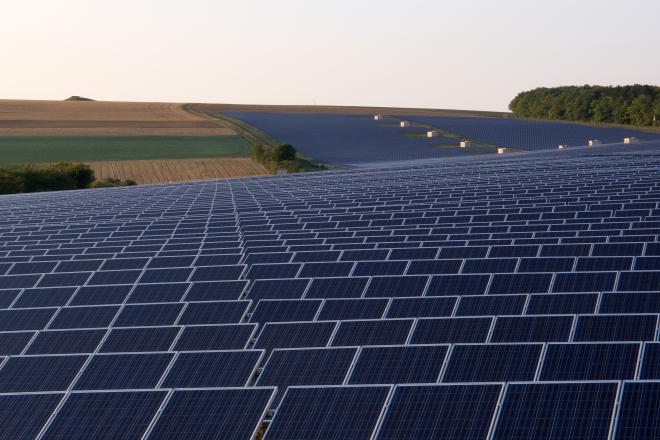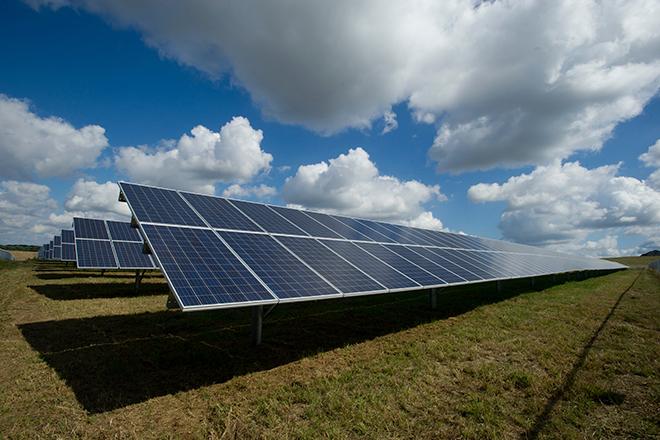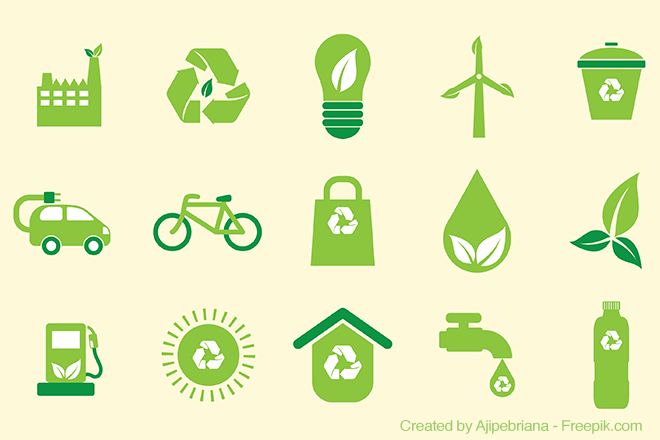Commercial Solar Electric Systems

Credit: Solarvoltaic System by OhWeh is licensed under CC BY-SA 2.5
Resource Description
AE 868 examines the theories and design practices of solar electric systems in the context of utility and commercial-scale applications. An important goal of the course is to equip solar professionals with skills to follow the impact of hardware trends in industry on feasibility, design, and the commissioning of such systems. Students will learn how to design solar electric systems as well as the processes required for permitting, construction, and commissioning. Topics include conceptual design of solar electric systems, solar electric technologies, inverter and power management technologies, design theory and economic analysis tools, system design processes for grid-tied and off-grid systems, integration of energy storage and demand response systems, construction project management, permitting, safety and commissioning, system monitoring, and maintenance. Learn moreEnergy in a Changing World

Credit: Green city concept, cut the leaves of plants, isolated over white by kirillov alexey, licensed through Shutterstock used with permission
Resource Description
What is energy? It's the hot in heat, the glow in light, the push in wind, the pound in water, the sound of thunder and the crack of lightning. It is the pull that keeps us (and everything else!) from simply flying apart, and the promise of an oak deep in an acorn. It is all the same, and it is all different. Sunshine and waterfalls won't start your car, and wind won't run the dishwasher. But, if we match the form and timing of the energy with your needs, all of these things could be true. Energy in a Changing World is about the full arc of energy transformation, delivery, use, economics and environmental impact, especially climate change. Learn moreEnergy Markets, Policy, and Regulation

Credit: Calculator by stevepb is licensed under CC0
Resource Description
EME 801 provides a broad introduction to global markets for crude oil and refined petroleum products, natural gas, and electric power. A major goal of the course is to help students understand how market design, market institutions, and regulatory structures affect firm-level decision-making in the energy industries and ultimately, how these decisions affect the functioning of energy markets and the prospects for alternative technologies. Students also learn the fundamentals of project finance and how to manage risks associated with policy changes, as well as risks associated with changes to the national, local, and global energy markets. Learn moreEnergy Policy

Credit: Purple Flowers by winterseitler is licensed under CC0
Resource Description
Energy policy sits at the crossroads of science and policy. And now, energy and climate policy are inextricably linked; the policies we choose have very real consequences for our climate. This intersection of science and policy is chaotic and bustles with activity motivated by various competing (and conflicting) interests and factors. We must understand the motivations driving them and bridge the divides between our reliance on fossil fuels and our need to transition to less carbon-intensive and renewable alternatives. While the science and math behind these problems is often fairly straightforward, the politics and behavioral changes are not. Come stand at this busy intersection with us as we navigate toward progressive climate policy alternatives at all scales of governance! Learn moreEthical Dimensions of Renewable Energy and Sustainability Systems

Credit: Solar Panels by American Public Power Association is free to use
Resource Description
This course presents an examination of ethical issues relevant to systems-based research procedures, professional conduct, social and environmental impacts, and embedded ethics in research and professional practice in RESS based jobs. In this course, you will consider case studies of ethical issues that can arise when engaging renewable energy and sustainability systems. You will also develop an ethics case study based on your area of RESS interests. The goals of the course are to provide you with tools for analyzing ethical issues both in the line of professional duties and in consideration of the various ethical issues that face an entire sector of renewable energy and that underpin the very reasons for taking a sustainable and renewable approach. Learn moreGlobal Energy Enterprise

Credit: Lobbying 161689 by OpenClipart-Vectors is licensed under CC0
Resource Description
Have you seen a Clean Coal baseball cap? In the challenge to meet soaring energy demand with limited resources, volatile issues like those related to the environment, national security and public health are often addressed outside of normal market transactions and are called externalities, or nonmarket factors. Stakeholders can act in resourceful ways to create a nonmarket environment that best serves their interest. A firm may challenge a law that makes it expensive or difficult to do business or compete with others, for example. An individual may organize a boycott of products or services that violate the individual's interests or principles--hey, don't buy from them! Nonmarket strategy in the energy sector is the subject of this engaging course. Learn moreOrientation to Energy and Sustainability Policy

Credit: Green Environmental Icons Collection from ajipebriana is free for use (modified)
Resource Description
EMSC 302 provides an orientation of the Energy and Sustainability Policy (ESP) degree program, preparing students for further study in the five program learning outcome areas: energy industry knowledge, global perspective, analytical skills, communication skills, and sustainability ethics. It also provides an introduction to the basic skills necessary to be successful in higher-ed online learning, including communication and library skills. Learn moreSustainability and Non-Market Enterprise

Credit: White Windmill by fxxu is licensed under CC0
Resource Description
The primary goal of this course is to provide a toolset for characterizing and strategizing how non-market forces can shape current and future renewable energy markets. The course approaches the exploration and explanation of key concepts in renewable energy and sustainability non-market strategies through evidence-based examples. Main topics for the course include: a sociological approach to markets, renewable energy markets, non-market conditions, complex systems analysis, and renewable energy technology and business environments. Because renewable energy costs are higher than fossil fuel cost per unit of energy, the main arguments in support of renewable energy, thus far, are functionally non-market in character, i.e., environmental (e.g., climate change), political (e.g., energy independence), and/ or social (e.g., good stewardship). Learn moreTechnologies for Sustainability Systems

Credit: Group of People Inside Building by Riccardo Bresciani is free to use
Resource Description
EME 807 overviews a wide range of contemporary technologies in the context of sustainability and examines metrics for their assessment. The course explores the main principles that guide modern science and technology towards sustainable solutions. It covers such topics as resource management technologies, waste and wastewater treatment, renewable energy technologies, high performance buildings and transportation systems, application of informatics and feedback to sustainable systems, and more. Learning in EME 807 heavily relies on real-life examples and taps into current practices of technology analysis. This course goes beyond understanding the background, fostering critical thinking and challenging the students to draw connections between social, environmental, and economic aspects of sustainable technologies. Learn moreUtility Solar Electric and Concentration

Credit: Blue Solar Panels by Carl Attard is free to use
